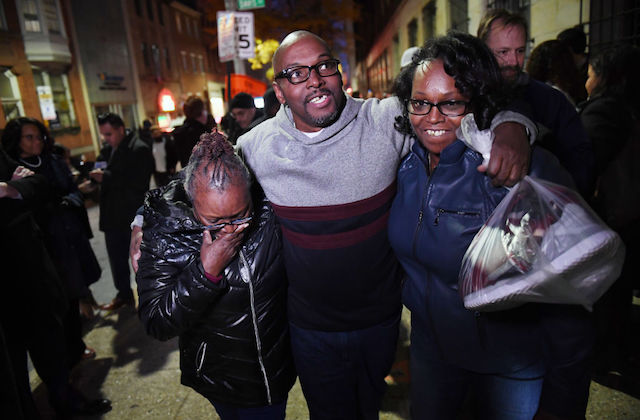Three innocent Maryland men will finally be able to spend the holidays with their families after serving 36 years in prison. Alfred Chestnut, Ransom Watkins and Andrew Stewart were exonerated on Monday (November 25) in the murder of Baltimore teenager DeWitt Duckett after a closer review of their case, Time reports.
The three men were released from police custody hours after a judge cleared their convictions and prosecutors dropped the charges in the murder of 14-year-old Duckett. The men were all teenagers in 1984 when they were sentenced to life in prison for murder.
The Baltimore Sun reports that Circuit Court Judge Charles Peters addressed the three men before wiping their convictions. “On behalf of the criminal justice system—and I’m sure this means very little to you gentlemen—I’m going to apologize,” he said.
The Sun detailed the case as follows:
rnt
On this month 36 years ago, DeWitt Duckett, a ninth-grader at Harlem Park Junior High School, was shot in his neck inside the West Baltimore school. Police said the 14-year-old boy was jumped by three youths for his blue Georgetown jacket. He struggled down the hallway and collapsed in the cafeteria. School officials called his death the first homicide in a Baltimore public school, and his killing touched off a firestorm of debate over school safety.
Police charged Chestnut, Watkins and Stewart Jr.—all 16 at the time—of Duckett’s murder. They were all sentenced to life in prison after four Harlem Park students testified against them. Per The Sun, “Police and prosecutors had claimed the Georgetown jacket found in Chestnut’s closet belonged to the victim. Now, they acknowledge the jacket had, in fact, come from his mother.”
According to The Sun, a detective and prosecutor coerced testimony from three student “witnesses” who have all since recanted. In fact, “multiple witnesses” reportedly pointed to another suspect, who was 18 years old at the time. Time reports:
rnt
One student saw him flee the scene and dump a gun as police arrived at Harlem Park Junior High School, but authorities at the time focused their investigation on the trio.
t
The new suspect was shot to death in 2002.
Shawn Armbrust, executive director of the Mid-Atlantic Innocence Project, which represents Watkins, spoke to Time about his client’s case. “Everyone involved in this case—school officials, police, prosecutors, jurors, the media and the community—rushed to judgment and allowed their tunnel vision to obscure obvious problems with the evidence,” he said. “This case should be a lesson to everyone that the search for quick answers can lead to tragic results.”
